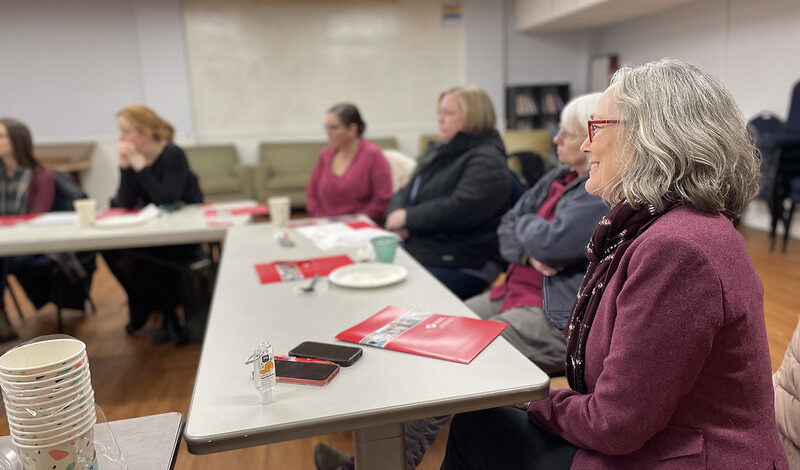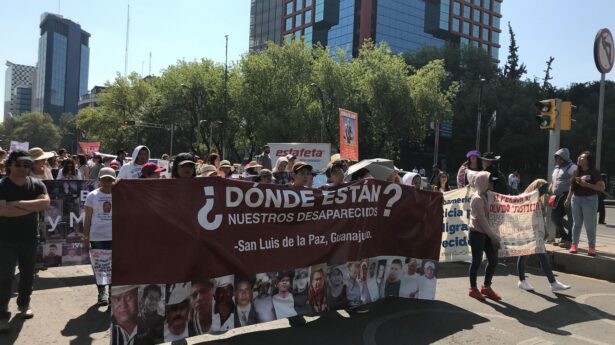The Unitarian Universalist Service Committee advances human rights through grassroots collaborations.
UUSC Hill Day: UUs Take Climate Concerns to the Capitol

By Deanna Johnson on March 5, 2024
On January 31, UU members, UUSC peer Earth Rights International, and UUSC teamed up for the first Hill Day event of the year.
Hill Day is an opportunity for people of faith and people of conscience to visit Congress, speak with decisionmakers, and discuss vital issues affecting numerous communities across the United States.
During the event, participants met with the offices of 10 members of Congress to discuss climate issues directly and indirectly affecting Black and Indigenous communities throughout the United States. The Hill Day group specifically looked to speak to senators and representatives with a record of supporting climate action as well as those who attended the 28th Conference of Parties (COP) held from November 13-December 12, 2023.
Overall, the event was a success. Reverend Kristin Grassel Schmidt, a UU minister in Silver Spring, MD, said, “It has just been a pleasure to be here with other people who want to work for justice and equity in our country. We’ve had some really good meetings with Senators’ staff from the different states and I’m looking forward to seeing the progress that is made.”
The group had three major asks for Congressmembers:
- Will you commit to keeping the promises that John Kerry made at COP28 by pledging $17.5M and increasing the funds pledged by the US for loss and damage funding?
During COP28, Former US Presidential Climate Envoy John Kerry announced that the United States would pledge $17.5 million to support the development and implementation of a global Loss and Damage Fund. UUSC and the Hill Day group want U.S. officials to make sure that the Biden administration keeps that promise. Moreover, the amount pledged represents less that 0.1% of the amount that the federal government has budgeted to be spent on energy (coal, gas, etc.) in 2024. The United States remains one of the largest global contributors to climate change, which directly leads to loss and damage.
- Considering the history of discrimination and inadequate government responses to the resettlement of Indigenous communities, we are urging the federal government to:
- Protect the Indian Reorganization Act (IRA) from efforts to dismantle it and ensure that Indigenous communities have the resources they need to access federal funds.
- Take the lesson of the Jean Charles Choctaw Nation and make sure it doesn’t happen to other communities and urge the Department of Housing and Urban Development (HUD) to investigate Louisiana’s discriminatory implementation of the resettlement program through a Title VI complaint.
Indigenous communities across the United States are at the front lines of the climate crisis and the effects of environmental racism. As a result, these communities are especially challenged with the burden of adapting and repairing their homes in the face of storms, fires, and flooding, while also having to make the hard decision of resettling their communities. The Jean Charles Choctaw Nation, located in Louisiana, is one of the first Indigenous communities forced to leave their homes due to the climate crisis. Today, the nation has lost approximately 98 percent of its land. Since 2014, Indigenous leaders have been developing a community-led resettlement plan, however, because Jean Charles Choctaw Nation is not a federally recognized tribe, they had to partner with the state of Louisiana to apply for grant funding through HUD. Eight years later, Louisiana representatives discriminatorily erased the Nation from inclusion in the grant, removed key disaster resilience components, and built 32 unsustainably constructed houses, undermining the support that the grant would have provided.
- Will you commit to writing a letter to the USDA urging them to implement the Section 22006 of the 2022 Inflation Reduction Act (IRA), Farm Loan Immediate Relief for Borrowers With At-Risk Agricultural Operations, in a timely and intentional manner?
Between 1910 and 1997, Black farmers lost 90 percent of their land, compared to just two percent lost by white farmers during the same time. The Inflation Reduction Act (IRA) passed in 2022 sought to curb inflation as part of Congress’ Build Back Better Plan. Within the act, $3 billion was allocated for farmer debt relief, however, Black farmers have yet to see a release of funds on par with the amount that has been released thus far to white farmers. This discrimination will continue the erasure of Black-owned farms throughout the United States.
Here’s a breakdown of the offices visited:
| Member | Committees |
| Sen. Tom Carper (D-DE) | Environment and Public Works (chair) |
| Sen. Sheldon Whitehouse (D-RI) | Environment and Public Works; Clean Air, Climate, and Nuclear Safety Subcommittee Budget (chair) |
| Sen. Lisa Murkowski (R-AK) | Energy and Natural Resources; Senate Indian Affairs; Climate Solutions Caucus |
| Sen. Jeff Merkley (D-OR) | Environment and Public Works; Foreign Relations; Climate Change Task Force |
| Sen. Ben Cardin (D-MD) | Environment and Public Works; Foreign Relations (chair); USAID Management Subcommittee |
| Sen. Ed Markey (D-MA) | Environment and Public Works; Environment, Oceans, Fisheries, Climate Change, and Manufacturing Subcommittee |
| Sen. Brian Schatz (D-HI) | Appropriations; Oceans, Fisheries, Climate Change, and Manufacturing Subcommittee; Foreign Relations Indian Affairs (chair) |
| Sen. Chris Van Hollen (D-MD) | Appropriations Foreign Relations Oceans Caucus |
| Rep. Mary Peltola (D-AK) | Natural Resources Native American Caucus Oceans Caucus |
Image Credit: UUSC

